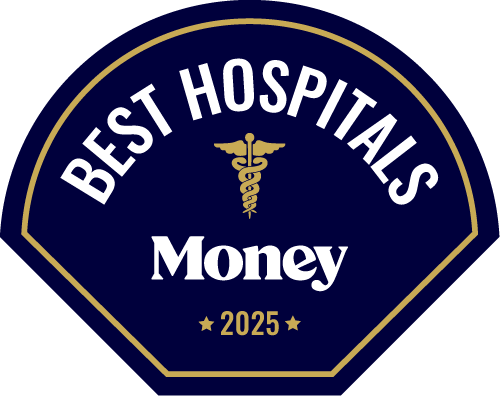Money’s ranking of the best hospitals for bariatric surgery whittles down the host of hospitals that provide weight-loss treatment into a list of 75 of the highest-quality institutions in the nation.
Our methodological approach favors facilities that have received strong quality care and patient ratings from the federal Centers of Medicare & Medicaid Services (CMS) as well as accreditation in metabolic and bariatric care from the American College of Surgeons.
Our data partner for this specialty list was Definitive Healthcare. We also relied on publicly available data from the ACS.
Here’s a detailed look at how we arrived at our top 75 choices.
Setting a strict benchmark
First, to be considered among the nation’s top facilities for bariatric care, a hospital must have met key standards of care that demonstrate it specializes in performing high-quality weight-loss surgeries.
We began by limiting the list to short-term, acute-care hospitals that have received a quality rating of three-stars or higher from the Centers for Medicare & Medicaid Services (CMS).
The CMS rating (included on the hospitals ranking as “Quality Rating”) is based on five key factors that are weighted as follows:
- Mortality (22%): reflects the death rates related to cardiovascular issues, strokes, pneumonia and treatable complications after surgery
- Safety (22%): tracks the rate of infections associated with certain surgeries, IVs and catheters and rates of complications after specific procedures
- Readmission (22%): considers how often some patients are readmitted to the hospital, along with how long they stayed and whether there were unplanned visits for outpatient treatment
- Patient experience (22%): gauges whether patients had a positive experience based on their self-reported ratings of how well their doctors and nurses communicated with them; other factors include whether their bathroom was clean and their room was quiet at night
- Timely and effective care (12%): estimates how quickly patients received care for chest pain or strokes; how long they stayed during an ER visit; percent of health care staff who are vaccinated for flu and COVID-19 and other time-sensitive metrics
Rewarding stand-out bariatric care
Next, the facilities that met this strict benchmark were given a hospital-level score, displayed on the ranking as the “Bariatric Grade.”
The letter grade is based on a numerical ranking score that follows this range:
- A+ is a score of 95% to 100%.
- A is 85% to 94.99%.
- A- is 80% to 84.99%.
- B+ is 75% to 79.99%.
- B is 65% to 74.99%.
- B- is CRS 60% to 64.99%.
- C+ is 55% to 59.99%.
- C is 45% to 54.99%.
- C- is 40% to 49.99%.
- D+ is 35% to 39.99%.
- D is 25% to 34.99%.
- D- is 20% to 24.99%.
- F is below 20%.
The factors that determined a hospital’s numerical ranking score were its CMS scores, (weighted at 25%), its clinical metrics (25%) and its bariatric specialization (50%).
The CMS scores include the star ratings for quality and patient experience, which gauge not only how safe a hospital is but also how patients feel about the care they received.
Among the clinical metrics we analyzed were serious complications, hospital-acquired conditions, readmission rates, CMS-imposed penalties for excess readmissions, participation in clinical trials and whether the hospital is a designated Academic Medical Center.
For the bariatric specialty portion, we rewarded hospitals that were accredited through the Metabolic and Bariatric Surgery Accreditation and Quality Improvement Program run by the American College of Surgeons and the American Society for Metability and Bariatric Surgery. Hospitals that performed a high number of bariatric procedures overall and as a portion of all surgeries were rewarded here as well.
Measuring price transparency
As with all our other hospital rankings, Money supplemented its analysis with our proprietary “Price Transparency” grade. While this grade is not a weighted factor in our rankings, it provides an indication of how closely the facility's final bill might align with its initial cost estimate.
This long-standing measure in our methodology was updated in 2025 to also account for the level of charity care (free care) provided to low-income patients.
To assess transparency, we analyzed how well hospitals’ publicly listed prices, called chargemaster rates, match the actual revenue collected from Medicare, insurers, and patients.
In simple terms: How does a hospital’s sticker price compare to what’s actually paid?
We used two standardized ratios to come up with an answer:
- One compared chargemaster prices to total patient payments (insured and uninsured).
- The other compared gross charges to Medicare-approved reimbursements.
Both were scaled to 100 points and converted to letter grades. Before calculating, we subtracted the value of charity care from each hospital’s gross charges, ensuring that providers offering more free care weren’t penalized for lower revenues.
Even with this adjustment, most patients still pay far less than the listed prices — sometimes significantly less. These differences aren’t discounts per se, but rather the result of negotiated rates, which contribute to opaque pricing and high healthcare costs overall.
It’s important to note that the transparency grade doesn’t measure affordability. A hospital with a B+ isn’t necessarily cheaper than one rated C; the score simply indicates how closely its listed prices reflect real-world payments.
Though it does not affect a hospital’s score or rank, the grade is intended to help patients better understand how reliable a hospital’s price estimates are likely to be.
Vetting the top-scoring hospitals
Numbers and data are the backbone of our analysis, but they don't always tell the whole story.
To ensure the integrity of our ranking, Money reviewed each hospital on our list for potential red flags that might not be apparent in the statistics.
Through this process, we removed several hospitals where patient care had been compromised, revealing deeper systemic issues. These issues include incidents such as falsified research, inaccurate hospital data, substantiated complaints of sexual harassment, malpractice or unnecessary treatments, all of which undermine patient care.
In the end, 75 hospitals made the cut, each one vetted by Money’s editorial team.
Data sources: Definitive Healthcare
Supplementary data: Agency for Healthcare Research and Quality; American College of Surgeons; American Society for Metabolic and Bariatric Surgery; Centers for Medicare & Medicaid Services; RAND Health Care






